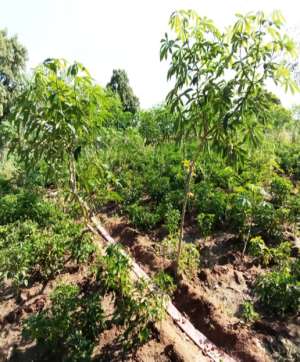
Undoubtedly, Agriculture is the mainstay of Ghana's economy. The sector is employing over 52% of the population in the active workforce. Government over the years have developed policies to boost the agriculture sectors. However, the politics of agriculture have impeded governments' strong commitment to developed tailored policy directions.
The agriculture sector in Northern Ghana is largely dependent on raid feed with most only becoming active in the rainy season. This act is compelling a lot of farmers to resort to charcoal burning, migration to some, or becoming unproductive. The lack of accessible irrigational facilities to all farmers in the country is threatening Ghana’s food security and sufficiency. Rain feed agriculture cannot meet our growing demand for food.
Remarkably, some farmers in the Kasile- Paga and Basengo Moo Communities in the Kassena- Nankana West District of the Upper East Region are taking some positive initiatives to invest in small irrigation systems for dry season farming. They have constructed wells engineered with a machine and connecting with Hydro or generator to draw water from the wells. Tubes or piles are then used to water their vegetables. This technology dotes in some households as farmers cultivate vegetables such as pepper, tomatoes, cabbage, lettuce, garden eggs and, others.
Some farmers bemoaned the lack of adequate support and capital intensive nature of developed the small irrigation scheme as a disincentive to venturing into commercial farming. They have also indicated, the lack of a ready market and the lack of storage facilities is a challenge to investing in perishable crops.
They, however, noted investing in the small irrigation system is worth it because they no longer sit idle in the dry season as the case of previous years when they lack the necessary capacity and ability to take action. It was observed that the lands used for gardens had been used to farm maize crops or legumes during the rainy season and the garden developed for dry season activities. Women, children support the men to take care of the crops in the gardening as they support in the watering of food crops.
The innovation of farmers in the Kassena – Nankana West District in the Upper East Region will soon turn the Upper East Region into a food hub in Ghana as a similar commitment of taking action in dry season farming is replicated in other parts of the region. The government must demonstrate the commitment to empowering rural farmers to actively get involved in Climate-smart agriculture.
Author; Tahiru Lukman
Youth Activist, Dev’t Consultant & Pan- African Author




 This IMANI job no dey pap; the people you are fighting for are always fighting y...
This IMANI job no dey pap; the people you are fighting for are always fighting y...
 Prof. Naana Opoku-Agyemang has changed; you can see a certain sense of urgency –...
Prof. Naana Opoku-Agyemang has changed; you can see a certain sense of urgency –...
 MFWA Executive Director slams Akoma FM for engaging in ‘irresponsible’ media pra...
MFWA Executive Director slams Akoma FM for engaging in ‘irresponsible’ media pra...
 ‘Women must become millionaires too’ — Prof Jane Naana on establishment of Women...
‘Women must become millionaires too’ — Prof Jane Naana on establishment of Women...
 Some believe only in Ghanaian votes, not Ghana — Kofi Asare jabs politicians
Some believe only in Ghanaian votes, not Ghana — Kofi Asare jabs politicians
 Plan to make BEST sole aggregator of Sentuo Oil Refinery will create market chal...
Plan to make BEST sole aggregator of Sentuo Oil Refinery will create market chal...
 2024 elections: I can't have the man I removed from office as my successor — Aku...
2024 elections: I can't have the man I removed from office as my successor — Aku...
 2024 Elections: Immediate-past NPP Germany Branch Chairman garners massive votes...
2024 Elections: Immediate-past NPP Germany Branch Chairman garners massive votes...
 Gov’t focused on making Ghana energy self-sufficient, eco-friendly – Akufo-Addo
Gov’t focused on making Ghana energy self-sufficient, eco-friendly – Akufo-Addo
 April 25: Cedi sells at GHS13.74 to $1, GHS13.14 on BoG interbank
April 25: Cedi sells at GHS13.74 to $1, GHS13.14 on BoG interbank
